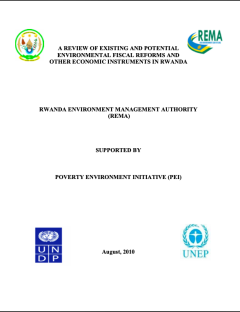
The report outlines how poverty levels and challenges of meeting the Millenium Development Goals (MDGs) in Rwanda are closely linked to widespread environmental degradation, a challenge further complicated by the fact that the economy is not sufficiently financed to address them.
This report has been made under the auspices of the Poverty-Environment Initiative (PEI) Phase II in Rwanda. The Initiative aims to enhance the contribution of sound environmental management to poverty reduction, sustainable economic growth, and achievement of the Millennium Development Goals (MDGs). Led by the Rwanda Environment Management Authority (REMA), and Ministry of Natural Resources (MINIRENA1 ), the intended outcome of the Rwanda PEI Phase II is the integration of the environment into national policy and district planning, policy and budget processes to implement the Economic Development and Poverty Reduction Strategy (EDPRS).
One of the 5 outputs under the Phase is: “Improved national funding levels for investing in environmental sustainability”. Systematic implementation of Environmental Fiscal Reform (EFR) and other economic instruments for environmental management can contribute to the above output. It has to be emphasized that EFR/ EIs are not implemented for their own sake, but rather as policy instruments in support of environmental management objectives.
